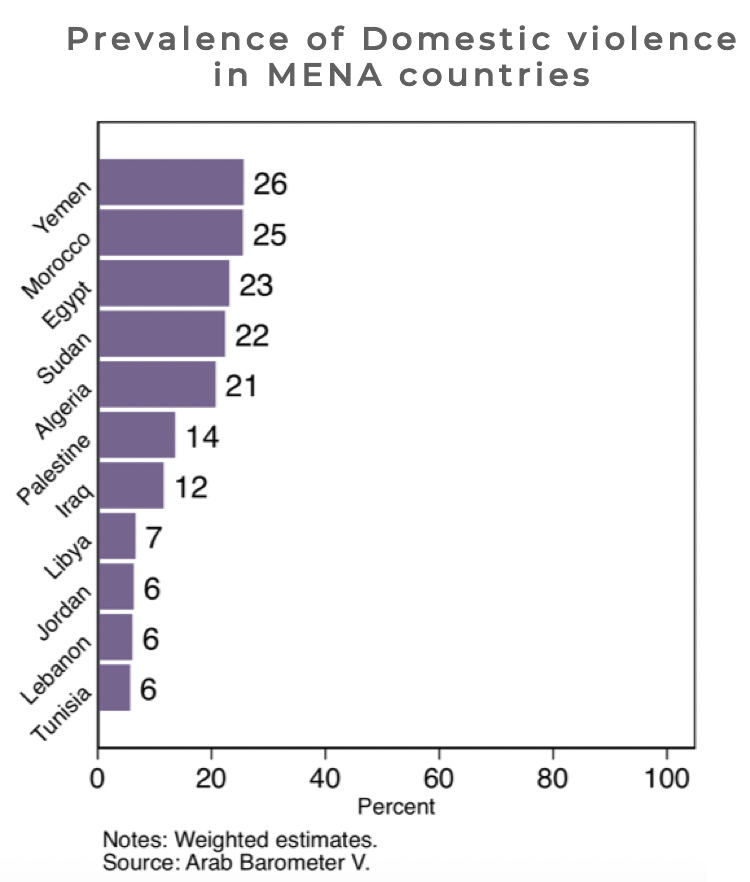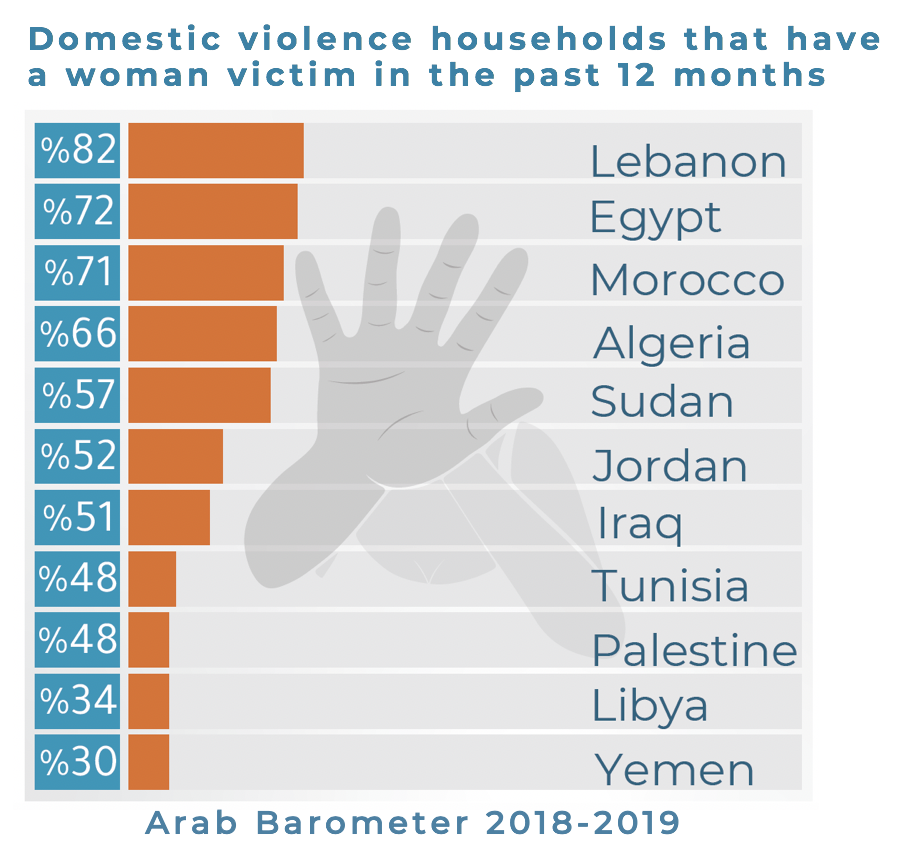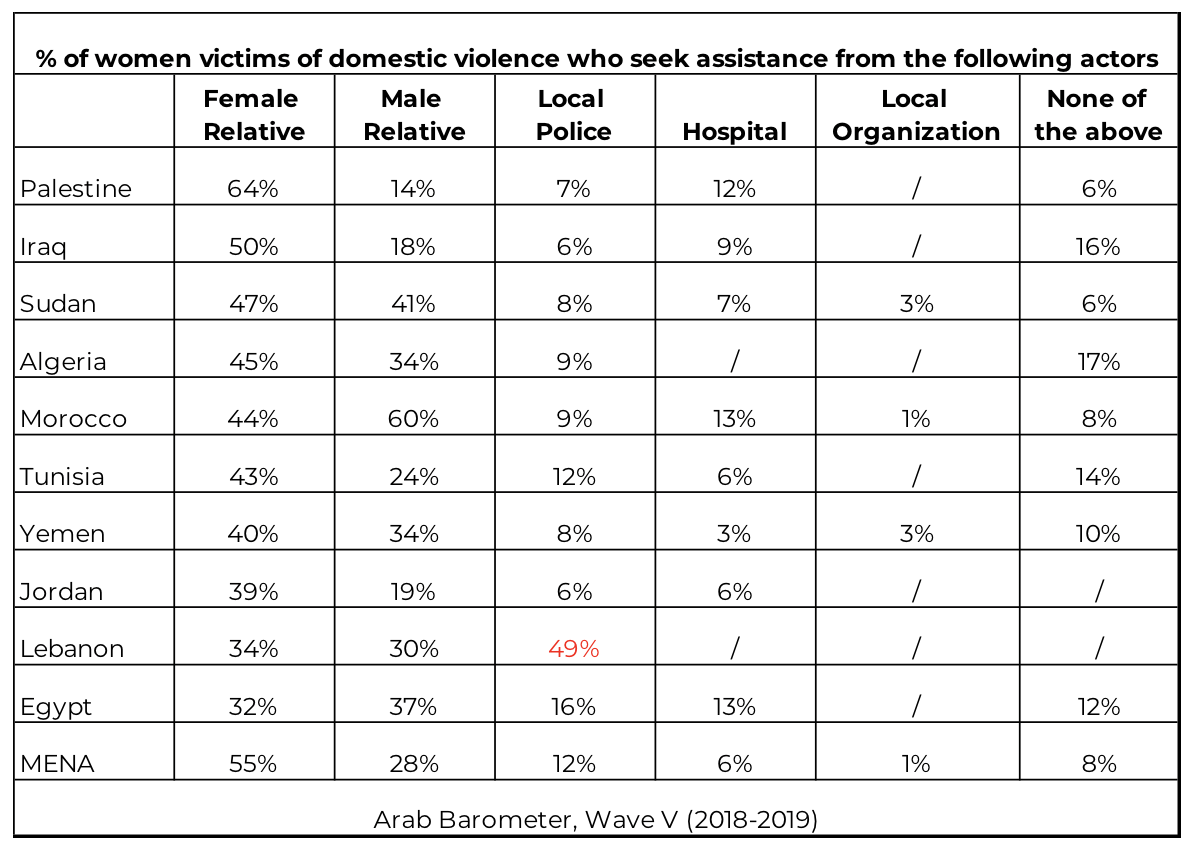Domestic violence is back on the radar in the public spheres across MENA due to the COVID-19 pandemic. As such, this crisis could serve as an opportunity to transform domestic violence from a private matter to a public concern in Arab countries and a chance to reform unequal gender relations through the elimination of long-standing gender norms.
Domestic violence historically a critical problem
Domestic violence was a critical problem in MENA region even before the onset of the COVID-19 pandemic. Around 15% of households across MENA include cases of domestic violence according to the Arab Barometer’s survey conducted in 2018-2019. Familial violence is relatively high in Yemen (26%), Morocco (25%), and Egypt (23%) while self-reported rates are lower in Libya (7%), Jordan, Lebanon and Tunisia (6% each).

Domestic violence can be targeted at both men and women and varies by country. In households where domestic violence occurs, the percent of domestic violence reports that include female victims is 82% in Lebanon, 72% in Egypt, 71% in Morocco, and 66% in Algeria. By contrast, the percent of domestic violence reports that include female victims is 34% in Libya, and 30% in Yemen.

Traditional Patriarchal Culture
Just like COVID-19 virus, gender-based violence affects women of all backgrounds. However, the situation is distinctly dismal in the Arab region because of the deeply rooted traditional patriarchal culture. For example, the majority of men (70%) in Arab countries say that husbands, rather than wives, should have the final say on family decisions, according to the Arab Barometer’s public opinion survey conducted last year. Moreover, many women across the region also agree with this statement. In six out of the twelve countries surveyed, more than half of the women believe that a husband should be the ultimate decision maker. This belief is consistent with sexist mentalities and male domination that in turn makes violence against women more likely to occur.
False Choice
Currently, with the prolonged quarantine in many countries, victims are often spending more time in the same house as their abuser, and incidents of abuse against women are increasing. Faced with these circumstances, women at risk are left with a difficult dilemma – either stay in and suffer at the hands of their abusers or escape with no guaranteed safe outcome in the midst of the pandemic. However, these two options ultimately represent a false choice. The underlying issue is that Arab governments have long failed to prioritize women’s health and protection in their emergency response planning and strategies. There are few if any readily available safe spaces for the women who suffer abuse to turn to, while the police and the medical centers are not well equipped or prepared for accommodating them. On the other hand, NGOs fighting for women’s rights in MENA are trying to fill in this gap, while adapting alternative methods given the social distancing restrictions. These methods include providing hotlines, online and phone counseling support, connecting victims with lawyers, allocating a temporary shelter, and launching awareness campaigns. Yet, still many women are not turning to the NGOs for help.
A Private Family Matter
Complicating this problem is the fact that domestic violence is still considered a private family matter across most Arab countries. Arab Barometer’s survey conducted in 2018-2019 shows that the majority of women victims across MENA (88%) turn to their female or male relatives for support. Only a minority of women across the region (12%) consider complaining to the local police about the violence. Lebanon stands out as an exception where nearly half of women victims say they report domestic violence to the local police (49%). This fact implies that, where they exist, existing laws against domestic abuse are not being widely enforced, and the abuser is exempt from punishment for their actions. In addition, only a minority of abused women (6%) across MENA go to the hospital for help, while almost none seeks support from local organizations. The COVID-19 pandemic has served to highlight the inadequacy of the support measures taken by the Arab authorities to protect survivors even before the outbreak.

Turning Crisis into Opportunity
The COVID-19 crisis provides an opportunity for Arab authorities to transform domestic violence from a private family matter to a public concern. As of 2019, only six countries in MENA have passed laws to combat domestic violence. According to local women’s rights activists and Human Rights Watch, these laws have several shortcomings that undermine their effectiveness to deter abusers from inflicting harm on women. As a short-term solution, authorities in Arab countries need to affirmatively address domestic violence as a public health crisis. They need to establish a solid collaboration between the police, criminal justice system, health sector and local women’s rights organizations to provide immediate relief and adequate support for women survivors of violence. In the long run, another major impediment to overcome is the discriminatory personal status laws in the Arab countries. Unless these laws are reformed and gender roles realigned toward equality, domestic violence will persist and Arab women victims will remain discouraged from seeking help outside the family.
This blog was originally published on Daraj media platform.



